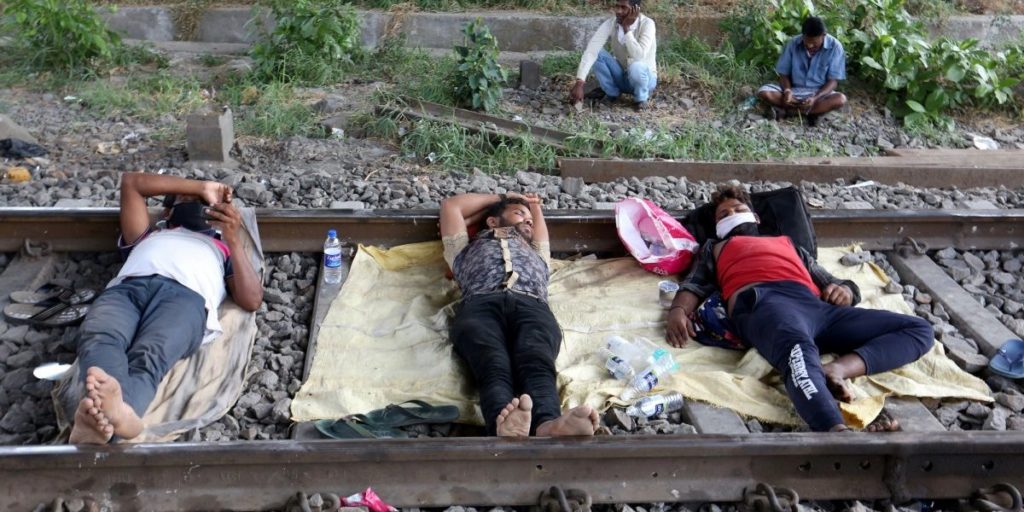Apoorvanand
Baked without love, kneaded without knowledge!
Justice without flavour, with a grey crust
The stale justice which comes too late.
These lines by Bertolt Brecht came to me when reading about the Supreme Court rejecting a plea by Harsh Mander and Anjali Bharadwaj. They had asked the court to direct the government to give monetary support to labourers who have been left without resources after the national lockdown was announced. The Supreme Court was not inclined to agree with them. It asked the Central government to submit a status report, and was satisfied with its efforts.
The plea was to give wages to the migrant labour who had lost their jobs. According to the India Legal Live,
“Chief Justice asked Prashant Bhushan that if the migrant workers were being provided meals then why did they need money for meals to which Mr. Bhushan replied “they don’t just need food in the shelter homes. we need to give them money to send to their families back home.”
Chief Justice Bobde negating Advocate Bhushan’s submissions said, “We cannot say at this stage that they are not getting the food.”
It was a very strange response to what Prashant Bhushan told the court. The chief justice could not understand the need for money when the workers were being provided with food. You don’t live only on food, the good justices must know.
The justices need not read experts writing about migrant labourers, and how they have families back in their villages waiting for money transfers. In earlier times, the postman was the most sought-after man in the villages, as he delivered the money orders. Loved ones who slogged in the factories, slept in kholis, bathed on public chapakals or under water taps saved money and wired it to their families.
Why do they need money, these labouring people, if our good and wise government feeds them?
In this period of pandemic, the lordships appear to believe, the labourers or their kin will not fall sick, they will not need medicines, they will not need milk for their children or they don’t deserve it, pregnant women will not need anything other than khichdi cooked with lot of mercy.
The latter part of the judgement is even more worrisome. The court told the petitioners that it did not want to apply its wisdom at this stage and would rather depend on the wisdom of the state:
“We are not experts and don’t intend to interfere without knowing what it is all about. We do not plan to supplant the wisdom of the government with our wisdom. We will ask the government to create a helpline for complaints.”
The court, in its own wisdom, thinks that in this moment of crisis, the government is the best judge. We have seen that in the recent past, the court has preferred to go by the word of the government. So, it decided that it was fake news that drove lakhs of workers out of cities like Delhi, Mumbai and Ahmedabad, and not their insecurity arising out of the loss of livelihood, again relying on the government’s claims.
It was gratifying to see the court modestly accepting that it is no expert. Brecht also says that justice cannot be done without knowledge. But is the government the most knowledgeable entity? What about the economists and sociologists who have spent their lives studying the lives of the poor?
The justices, when they have time from reading the official press handouts, can read about the challenge of getting food that these migrant labourers are facing. The Hindi newspapers and TV channels find all this negative and want to save the people of India from this depressing picture, to keep their morale up. It seems the court is also doing the same.
The invocation of expertise and knowledge in the discussion on justice is interesting. We have seen justice being improvised in the same court. We saw it in the case of the Babri Masjid title suit and the state action in Jammu and Kashmir. The court was not inclined to listen to the experts. It seems to suggest the government is the sole repository of knowledge and wisdom.
Justice, to be justice, has to act on behalf of the weak. The people, when faced with the state, are weak. Justice has to tilt the balance in their favour. Secondly, it needs to feel for them. If it is devoid of love for those suffering inequality, then it is no justice.
Justice should not become an event. It is a daily, hourly thing.
Brecht himself has written at another place,
“When evil-doing comes like falling rain, nobody calls out “stop!” When crimes begin to pile up they become invisible. When sufferings become unendurable the cries are no longer heard. The cries, too, fall like rain in summer.”
Good samaritans like Harsh Mander and Anjali Bhardwaj ran to the court, calling out ‘stop’. The court knows what is happening but chooses not to act. This is no justice.
Courts were meant to be there for the people. They have chosen to stand for the government. Justice is about putting the power on the course of truth. If it fails to do that, it doesn’t remain justice. Again, to go back to the poet:
As daily bread is necessary
So is daily justice. It is even necessary several times a day.
From morning till night, at work, enjoying oneself.
At work which is an enjoyment.
In hard times and in happy times
The people requires the plentiful, wholesome
Daily bread of justice.
Since the bread of justice, then, is so important
Who, friends, shall bake it?
Who bakes the other bread?
Like the other bread
The bread of justice must be baked
By the people.
(The author teaches at Delhi University.)




